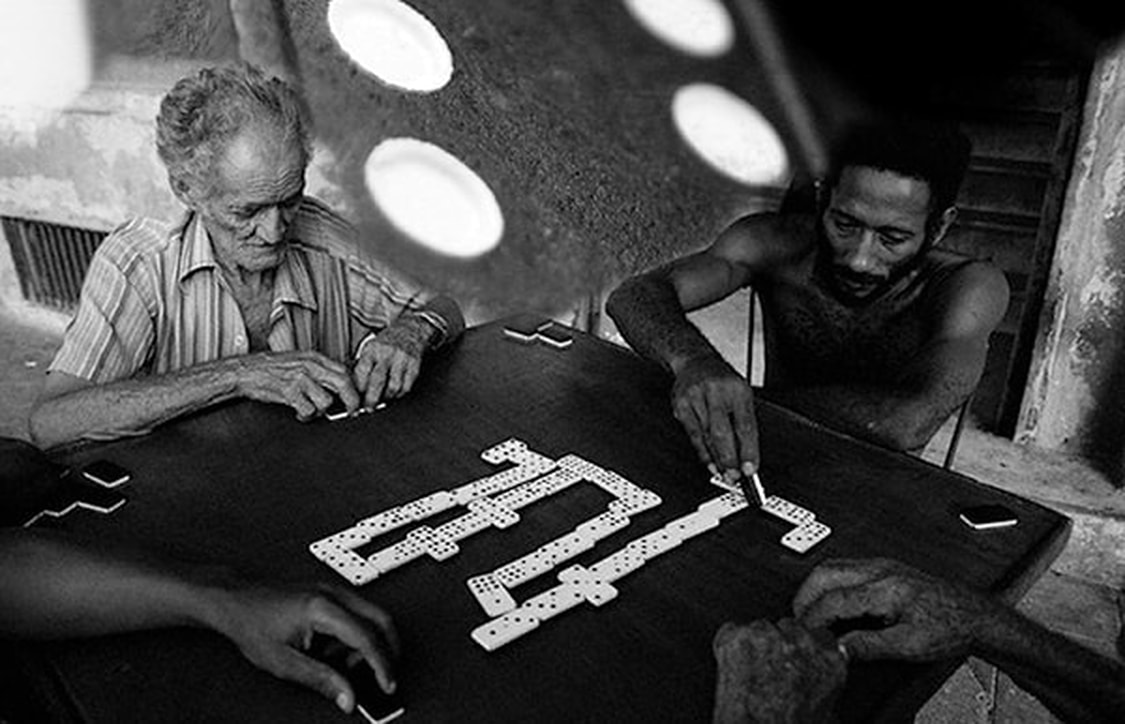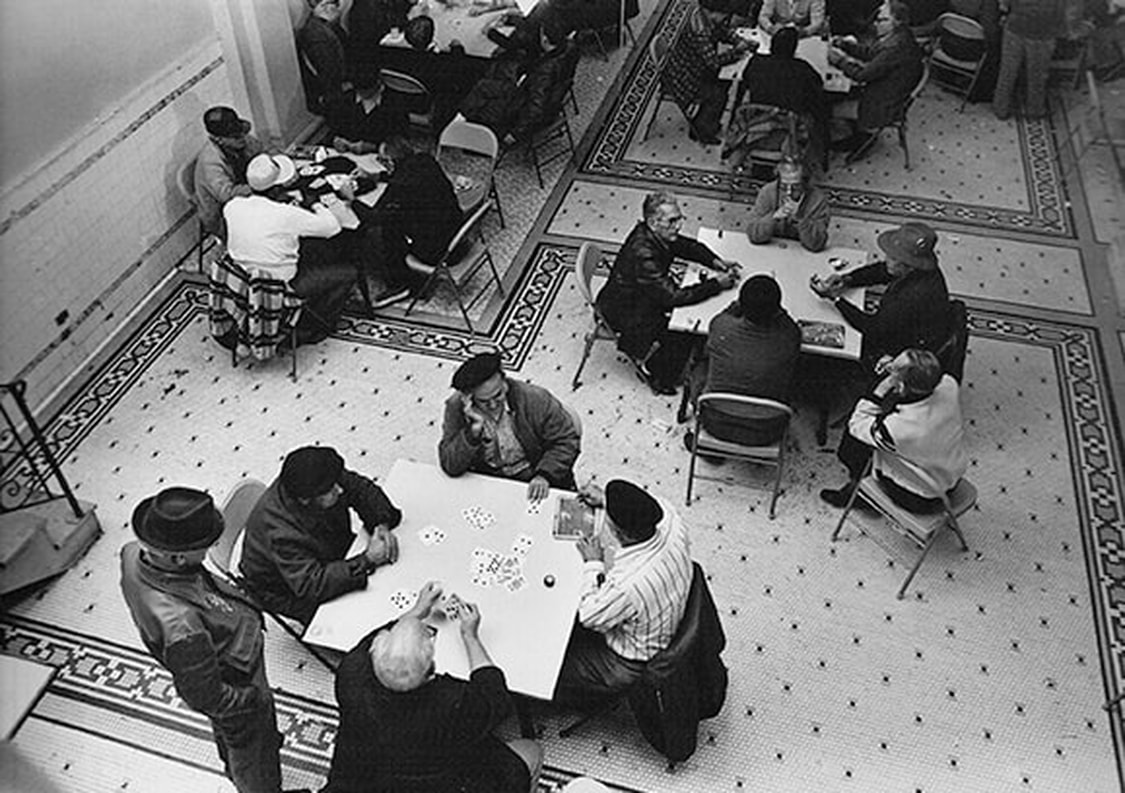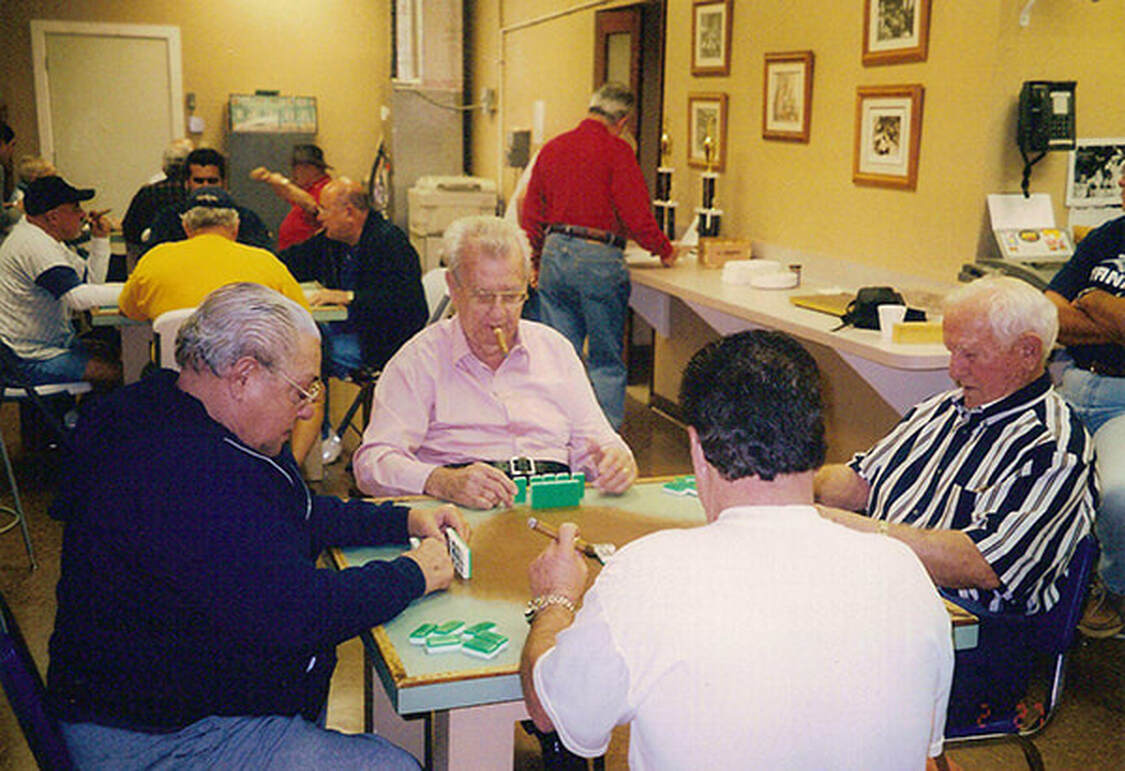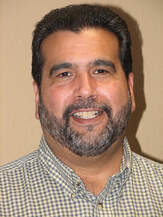|
Dominos, the game, not the pizza franchise, has been a part of Tampa’s Latin culture for as long as anyone can remember. Although it appears to have been invented by the Chinese, with the oldest known domino sets dating as far back as 1120 A.D., it has become a tradition in our Hispanic culture. There are many versions of the game played throughout the United States and the rest of the world, but in Ybor City and West Tampa, playing dominos is as much a part of our heritage as cigars, café con leche y pan con mantequilla (Cuban coffee with milk and buttered Cuban bread). Tampa brought much more than their skills as cigar makers, bakers, carpenters, and masons. They also brought the things that were part of their culture, like food, music, and games such as dominos. During those times, men gathered on front porches and social clubs to play the most popular version of this game–the Cuban Double Nine Dominos. These social clubs like L’ Unione Italiana founded in 1894, Círculo Cubano, Centro Español de Ybor, Centro Asturiano, La Union Martí–Maceo, and the Centro Español de West Tampa provided a place for friends to gather, have a drink, smoke a cigar and play cards and dominos. People who have never played the organized game of dominos will probably associate it with a child’s game of matching the numbered dots. Others may even assume that the whole purpose of these rectangular-shaped tiles or fichas is to stand them on end next to each other in a snake-like design, knock the last domino down and watch them fall over. However, I can assure you that this is not a child’s game, and dominos were not invented to be knocked down. The organized game is played with (4) four players, two as partners sitting across from one another on a square table. The double nine domino set has fifty-five fichas, ten of each number, including the blanks and doubles placed face down on the table and mixed up. Each player will draw ten fichas each, and the remaining fifteen fichas stay face down on the sides of the table and are not used. The player designated to start play will place a ficha in the center of the table. This play, also referred to as la salida (to open or lead), should, in most cases, be double the amount he has the most of. This is the most critical move of the game and is the one that sets the strategy that will be used. For example, if your partner’s salida were the double nine, you would assume he has many nines; therefore, your job is to try to keep nines on the table and not play on the salida if possible. Your opponent’s job is to kill all the nines and block your moves to cause you to pass. Once the first ficha is played, the player to the right (counterclockwise) continues to play. If the next player has no fichas in his hand that match the open-end fichas on the table, he will signal that he passes by knocking on the table. The first player to finish playing all ten of their fichas is the winner, and this final play is called Domino. The game can also end when it becomes closed or cerrado, meaning no further play can continue because no one has a match for the fichas that are open on the table. At this point, all players turn over their remaining fichasand count the points or dots they have. The player with the least amount of points wins. The two losing players add and note their points under the winner’s score. The first team to reach 100 points wins the match, but winning the match without allowing your opponents to score any points gives you extra bragging rights to claim you have won by giving the losers a pollona (loosely translated to mean you skunked them). Playing dominos in this team format requires skill and, most of all, a sharp mind; you have to remember what number fichas have been played by each player and the ones they have passed on during that game. Knowing the rules is essential, but knowing how to get around the rules is even more important. Ask any veteran Domino player what the most ignored rule of the game is, and they will surely tell you the “no talking rule.” This has been quoted since the beginning of time as este juego lo invento un sordomudo (a deaf-mute invented this game). Dominos is a social event; talking, bantering, friendly insults, and questioning your partner's skills are a significant part of the strategy needed to win. However, you have to pay close attention to what is being said because, in this idle trash talk, there are sometimes hidden messages to their partners on what number fichas they have or don’t have. Other things to watch for are forros which is a term used when it is found that a player tries to play a ficha that does not match the one on the table. Also, you need to ensure a player does not discard one of his fichas into the pile of unused fichas on the sides of the table. These could be considered cheating to the average person, but it's all in how you interpret it. To play with the old timers, you’d better have thick skin and be able to take the abuse; one wrong move and you forget your partner’s salida and kill it, or you don’t block the opponent's play, and they win because of this, and you will never hear the end of it. One thing that holds true for all old-timers or veteran domino players is that they think they are the best in the world; therefore, no matter what play you make, someone will always question it. For the most part, games are not played for money. In the social clubs, the losers would have to buy the winners a drink, cup of coffee, or maybe a cigar as the prize, but, most of all, the real reward for winning–even to this day–is the bragging rights. To better understand how important winning is to some players, I would like to share a story that was told to me by Salvador Valdes, a veteran domino player, which took place in Cuba over 50 years ago. In those days, when a person passed away, the funeral wake was held in the family member’s home and lasted all night into the morning hours. The casket was set up in the living room, friends and family would come over to pay their respects, and there would be food and drinks for the guests. In this story, as the night progressed, a domino table was set up close to the casket, and a game was started in honor of the deceased, who had been an avid domino player his whole life. At one point, an argument broke out between the four players, with one accused of playing a forro (cheating). The fight continued, and suddenly, the man charged with cheating flipped the domino table over, knocking the casket to the floor. Thank goodness the casket lid was closed when this happened! They placed the casket back on the stand and ended the game. Although the competition can sometimes be intense in most games, this type of action rarely occurs. As a child growing up in West Tampa, I can still remember those special times of playing dominos with my father, Oscar Garrido, and my two brothers, Danny, and Frank. In our eyes, my father was an expert player, and we were amazed at how he knew what fichas we would play even before we knew. He would place a fichaface down on the table, spin it, and tell us, “This is the one you are going to play next.” Sure enough, when you picked the one you wanted to play, he would flip his spinning ficha over, and the numbers matched. Little did we know then that he would have a good idea of what numbers were still available by counting the dominos that had already been played. When it came time to count the points we had left over, with one glance at the fichas he could tell you how many points there were, and he was always right. I always looked forward to when I was allowed to go with my father to the Centro Español de West Tampa or Centro Asturiano to watch him play dominos with his friends. His passion and devotion to the game drove him to become President of the West Tampa Domino Club on Columbus Drive in the early 1980s to keep the club open. Through the years, these experiences have fueled my interest in the game and moved me to keep the tradition of friends gathering to play dominos a reality. Just about every Saturday morning for the last ten years, we have gathered at Vincent & Tampa Cigar Company, have our café con leche y pan con mantequilla, smoke a cigar, and exchange friendly insults as we play dominos using the same set my father had when he introduced me to the game 40 years ago. We have lost some great domino players who have passed away, like Luis “Bicicleta” Perez and Vicente “Majomia” Ruilova; however, we continue the tradition. As you can imagine, we all feel we are the best in the world, but I don’t think we are ready yet to challenge the veteran domino players from the Centro Asturiano. CIGAR CITY MAGAZINE- NOVEMBER/DECEMBER 2006 Art & Photography Contributors: Hillsborough County Public Library, Tampa Bay History Center, The Florida State Archives, The Tampa Tribune/Tampa Bay Times, University of South Florida Department of Special Collections, Ybor City Museum Society, private collections and/or writer. MARIO GARRIDOMario Garrido is a West Tampa native and was once the President of Vincent & Tampa Cigar Co. He has worked in the Tampa cigar industry for 40 years and was the Production Manager for Havatampa, a division of Altadis U.S.A., the largest cigar company in the world. FOLLOW CIGAR CITY MAGAZINE
0 Comments
Your comment will be posted after it is approved.
Leave a Reply. |
Archives
June 2013
Categories
All
|
Cigar City is a Florida trademark and cannot be used without the written permission of its owner. Please contact [email protected]
© 2021 Cigar City Magazine. ALL RIGHTS RESERVED.
© 2021 Cigar City Magazine. ALL RIGHTS RESERVED.





 RSS Feed
RSS Feed